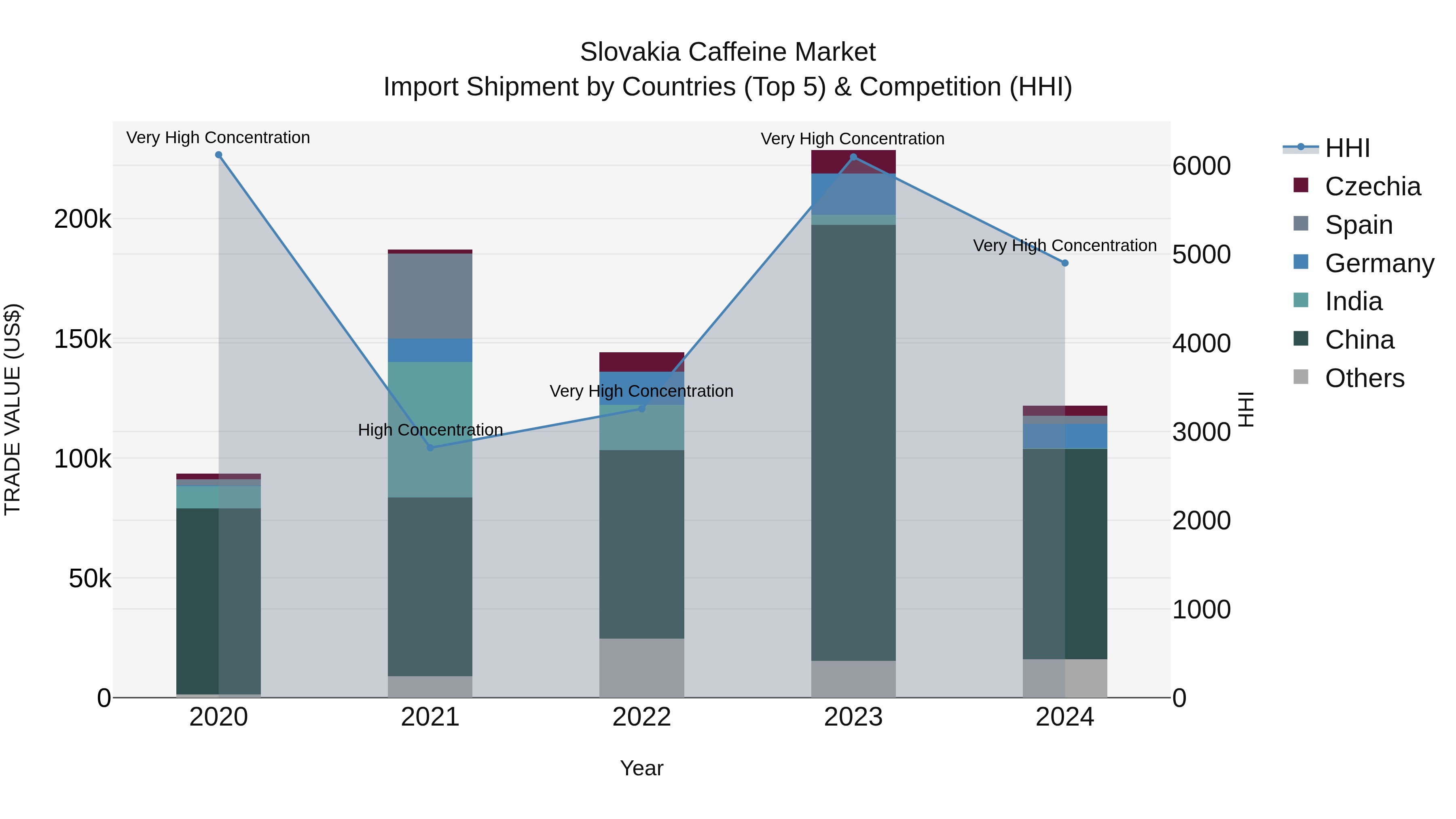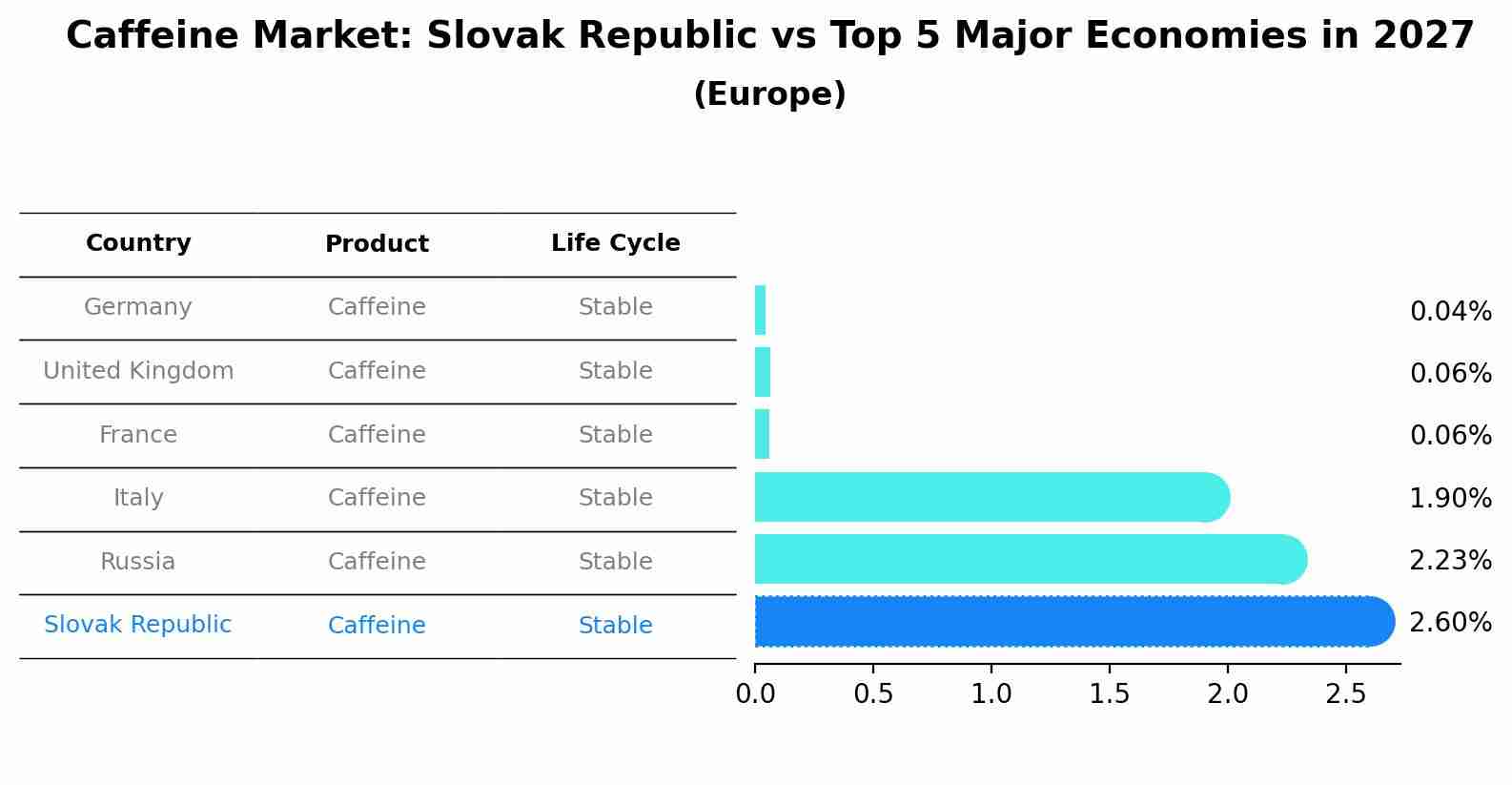Slovakia Caffeine Market Outlook | Size, Industry, COVID-19 IMPACT, Growth, Companies, Revenue, Forecast, Value, Share, Analysis & Trends
| Product Code: ETC110019 | Publication Date: Jun 2021 | Updated Date: Nov 2025 | Product Type: Report | |
| Publisher: 6Wresearch | Author: Shubham Padhi | No. of Pages: 70 | No. of Figures: 35 | No. of Tables: 5 |
Slovakia Caffeine Market Top 5 Importing Countries and Market Competition (HHI) Analysis
Slovakia`s caffeine import Market Top 5 Importing Countries and Market Competition (HHI) Analysis in 2024 continued to be dominated by key players including China, Germany, Netherlands, Czechia, and Mongolia. The high concentration level, as indicated by the Herfindahl-Hirschman Index (HHI), reflects the Market Top 5 Importing Countries and Market Competition (HHI) Analysis`s reliance on these top exporting countries. Despite a strong compound annual growth rate (CAGR) of 6.86% from 2020 to 2024, the Market Top 5 Importing Countries and Market Competition (HHI) Analysis experienced a significant decline in growth rate from 2023 to 2024 at -46.68%. This highlights potential shifts in consumer demand or supply chain disruptions that impacted the caffeine import industry in Slovakia.

Caffeine Market: Slovak Republic vs Top 5 Major Economies in 2027 (Europe)
The Caffeine market in Slovak Republic is projected to grow at a stable growth rate of 2.60% by 2027, within the Europe region led by Germany, along with other countries like United Kingdom, France, Italy and Russia, collectively shaping a dynamic and evolving market environment driven by innovation and increasing adoption of emerging technologies.

Slovakia Caffeine Market Overview
The Slovakia caffeine market is witnessing steady growth driven by the increasing consumption of coffee, energy drinks, and other caffeinated beverages among the population. Coffee remains the most popular caffeinated beverage in Slovakia, with a strong café culture and a preference for high-quality specialty coffee. The market also sees a rising demand for energy drinks among young consumers seeking a quick energy boost. Health-conscious consumers are increasingly turning to alternative sources of caffeine, such as green tea and herbal beverages. Key players in the Slovakia caffeine market include international coffee chains, local coffee roasters, and energy drink manufacturers. The market is expected to continue growing as the trend towards convenience and on-the-go consumption drives innovation in product offerings and packaging formats.
Slovakia Caffeine Market Trends
In the Slovakia caffeine market, there is a growing trend towards premium and specialty coffee products, driven by the increasing interest in coffee culture and quality among consumers. Artisanal coffee shops offering unique and high-quality brews have been gaining popularity, appealing to a more discerning customer base. Additionally, there is a rising demand for healthier and functional beverages, leading to the introduction of innovative caffeinated products such as cold brews, nitro coffees, and plant-based alternatives. Sustainability and ethical sourcing practices are also becoming important factors for consumers when choosing caffeinated products, with a growing preference for brands that prioritize environmental and social responsibility. Overall, the Slovakia caffeine market is evolving to cater to changing consumer preferences for premium, unique, and sustainable caffeine products.
Slovakia Caffeine Market Challenges
In the Slovakia Caffeine Market, one of the primary challenges faced is increasing competition from both international and domestic caffeine product suppliers. This leads to price wars and the need for companies to differentiate their products to attract and retain customers. Additionally, there is a growing trend towards healthier lifestyles and a shift in consumer preferences towards natural and organic products, which poses a challenge for traditional caffeine products that may be perceived as artificial or unhealthy. Regulatory issues and compliance with food safety standards also present challenges for caffeine product manufacturers in Slovakia, requiring continuous monitoring and adaptation to changing regulations. Overall, staying competitive in a dynamic market environment while meeting evolving consumer demands and regulatory requirements remains a key challenge for players in the Slovakia Caffeine Market.
Slovakia Caffeine Market Investment Opportunities
The Slovakia Caffeine Market presents several investment opportunities for growth and innovation. With an increasing consumer demand for caffeinated products such as coffee, tea, energy drinks, and supplements, there is potential for companies to expand their product offerings and cater to evolving preferences. Investing in the development of new caffeine-infused beverages or functional food products tailored to the Slovakian market could prove lucrative. Additionally, there is room for investment in sustainable and ethically sourced caffeine products to align with the growing trend towards conscious consumerism. Collaborating with local coffee producers or investing in eco-friendly packaging solutions could also differentiate a company in the market and attract environmentally-conscious consumers. Overall, the Slovakia Caffeine Market offers opportunities for investors to capitalize on the rising demand for caffeine products while promoting innovation and sustainability.
Slovakia Caffeine Market Government Policy
Government policies related to the Slovakia Caffeine Market primarily focus on regulating the sale and consumption of caffeine-containing products to ensure consumer safety. The Slovakian government has set maximum allowable levels of caffeine in various products, such as energy drinks and dietary supplements, to prevent adverse health effects from excessive consumption. Additionally, labeling requirements mandate clear and accurate information on caffeine content to help consumers make informed choices. The government also monitors advertising practices to prevent misleading claims about caffeine products. Overall, the regulatory framework aims to strike a balance between promoting a competitive caffeine market and protecting public health through stringent quality and safety standards.
Slovakia Caffeine Market Future Outlook
The Slovakia Caffeine Market is projected to experience steady growth in the coming years, driven by increasing consumer awareness of the benefits of caffeine consumption, particularly in the form of coffee, energy drinks, and dietary supplements. The market is expected to see a rise in demand for innovative caffeine products catering to different consumer preferences, such as organic and low-sugar options. Additionally, the growing trend of on-the-go consumption and the rising popularity of specialty coffee shops are likely to further boost market growth. However, factors such as regulatory constraints, health concerns, and competition from alternative energy-boosting ingredients may pose challenges to the market`s expansion. Overall, with evolving consumer preferences and a dynamic product landscape, the Slovakia Caffeine Market is poised for gradual but sustained growth in the foreseeable future.
Key Highlights of the Report:
- Slovakia Caffeine Market Outlook
- Market Size of Slovakia Caffeine Market, 2021
- Forecast of Slovakia Caffeine Market, 2027
- Historical Data and Forecast of Slovakia Caffeine Revenues & Volume for the Period 2018 - 2027
- Slovakia Caffeine Market Trend Evolution
- Slovakia Caffeine Market Drivers and Challenges
- Slovakia Caffeine Price Trends
- Slovakia Caffeine Porter's Five Forces
- Slovakia Caffeine Industry Life Cycle
- Historical Data and Forecast of Slovakia Caffeine Market Revenues & Volume By Type for the Period 2018 - 2027
- Historical Data and Forecast of Slovakia Caffeine Market Revenues & Volume By Natural Caffeine for the Period 2018 - 2027
- Historical Data and Forecast of Slovakia Caffeine Market Revenues & Volume By Synthetic Caffeine for the Period 2018 - 2027
- Historical Data and Forecast of Slovakia Caffeine Market Revenues & Volume By Applications for the Period 2018 - 2027
- Historical Data and Forecast of Slovakia Caffeine Market Revenues & Volume By Pharmaceuticals for the Period 2018 - 2027
- Historical Data and Forecast of Slovakia Caffeine Market Revenues & Volume By Food for the Period 2018 - 2027
- Historical Data and Forecast of Slovakia Caffeine Market Revenues & Volume By Beverages for the Period 2018 - 2027
- Historical Data and Forecast of Slovakia Caffeine Market Revenues & Volume By Flavours and Fragrances for the Period 2018 - 2027
- Slovakia Caffeine Import Export Trade Statistics
- Market Opportunity Assessment By Type
- Market Opportunity Assessment By Applications
- Slovakia Caffeine Top Companies Market Share
- Slovakia Caffeine Competitive Benchmarking By Technical and Operational Parameters
- Slovakia Caffeine Company Profiles
- Slovakia Caffeine Key Strategic Recommendations
Frequently Asked Questions About the Market Study (FAQs):
Export potential assessment - trade Analytics for 2030
Export potential enables firms to identify high-growth global markets with greater confidence by combining advanced trade intelligence with a structured quantitative methodology. The framework analyzes emerging demand trends and country-level import patterns while integrating macroeconomic and trade datasets such as GDP and population forecasts, bilateral import–export flows, tariff structures, elasticity differentials between developed and developing economies, geographic distance, and import demand projections. Using weighted trade values from 2020–2024 as the base period to project country-to-country export potential for 2030, these inputs are operationalized through calculated drivers such as gravity model parameters, tariff impact factors, and projected GDP per-capita growth. Through an analysis of hidden potentials, demand hotspots, and market conditions that are most favorable to success, this method enables firms to focus on target countries, maximize returns, and global expansion with data, backed by accuracy.
By factoring in the projected importer demand gap that is currently unmet and could be potential opportunity, it identifies the potential for the Exporter (Country) among 190 countries, against the general trade analysis, which identifies the biggest importer or exporter.
To discover high-growth global markets and optimize your business strategy:
Click Here- Single User License$ 1,995
- Department License$ 2,400
- Site License$ 3,120
- Global License$ 3,795
Search
Thought Leadership and Analyst Meet
Our Clients
Related Reports
- Pakistan Contraceptive Implants Market (2025-2031) | Demand, Growth, Size, Share, Industry, Pricing Analysis, Competitive, Strategic Insights, Strategy, Consumer Insights, Analysis, Investment Trends, Opportunities, Revenue, Segments, Value, Segmentation, Supply, Forecast, Restraints, Outlook, Competition, Drivers, Trends, Companies, Challenges
- Sri Lanka Packaging Market (2026-2032) | Outlook, Competition, Drivers, Trends, Demand, Pricing Analysis, Competitive, Strategic Insights, Companies, Challenges, Strategy, Consumer Insights, Analysis, Investment Trends, Opportunities, Growth, Size, Share, Industry, Revenue, Segments, Value, Segmentation, Supply, Forecast, Restraints
- India Kids Watches Market (2026-2032) | Strategy, Consumer Insights, Analysis, Investment Trends, Opportunities, Growth, Size, Share, Industry, Revenue, Segments, Value, Segmentation, Supply, Forecast, Restraints, Outlook, Competition, Drivers, Trends, Demand, Pricing Analysis, Competitive, Strategic Insights, Companies, Challenges
- Saudi Arabia Core Assurance Service Market (2025-2031) | Strategy, Consumer Insights, Analysis, Investment Trends, Opportunities, Growth, Size, Share, Industry, Revenue, Segments, Value, Segmentation, Supply, Forecast, Restraints, Outlook, Competition, Drivers, Trends, Demand, Pricing Analysis, Competitive, Strategic Insights, Companies, Challenges
- Romania Uninterruptible Power Supply (UPS) Market (2026-2032) | Industry, Analysis, Revenue, Size, Forecast, Outlook, Value, Trends, Share, Growth & Companies
- Saudi Arabia Car Window Tinting Film, Paint Protection Film (PPF), and Ceramic Coating Market (2025-2031) | Strategy, Consumer Insights, Analysis, Investment Trends, Opportunities, Growth, Size, Share, Industry, Revenue, Segments, Value, Segmentation, Supply, Forecast, Restraints, Outlook, Competition, Drivers, Trends, Demand, Pricing Analysis, Competitive, Strategic Insights, Companies, Challenges
- South Africa Stationery Market (2025-2031) | Share, Size, Industry, Value, Growth, Revenue, Analysis, Trends, Segmentation & Outlook
- Afghanistan Rocking Chairs And Adirondack Chairs Market (2026-2032) | Size & Revenue, Competitive Landscape, Share, Segmentation, Industry, Value, Outlook, Analysis, Trends, Growth, Forecast, Companies
- Afghanistan Apparel Market (2026-2032) | Growth, Outlook, Industry, Segmentation, Forecast, Size, Companies, Trends, Value, Share, Analysis & Revenue
- Canada Oil and Gas Market (2026-2032) | Share, Segmentation, Value, Industry, Trends, Forecast, Analysis, Size & Revenue, Growth, Competitive Landscape, Outlook, Companies
Industry Events and Analyst Meet
Whitepaper
- Middle East & Africa Commercial Security Market Click here to view more.
- Middle East & Africa Fire Safety Systems & Equipment Market Click here to view more.
- GCC Drone Market Click here to view more.
- Middle East Lighting Fixture Market Click here to view more.
- GCC Physical & Perimeter Security Market Click here to view more.
6WResearch In News
- Doha a strategic location for EV manufacturing hub: IPA Qatar
- Demand for luxury TVs surging in the GCC, says Samsung
- Empowering Growth: The Thriving Journey of Bangladesh’s Cable Industry
- Demand for luxury TVs surging in the GCC, says Samsung
- Video call with a traditional healer? Once unthinkable, it’s now common in South Africa
- Intelligent Buildings To Smooth GCC’s Path To Net Zero


















